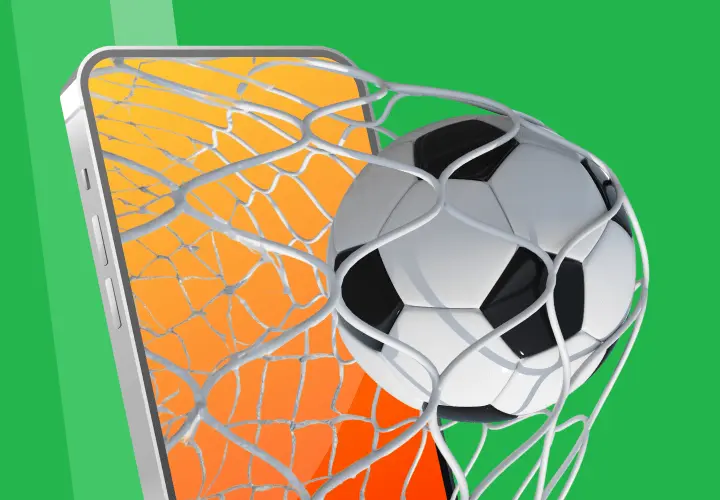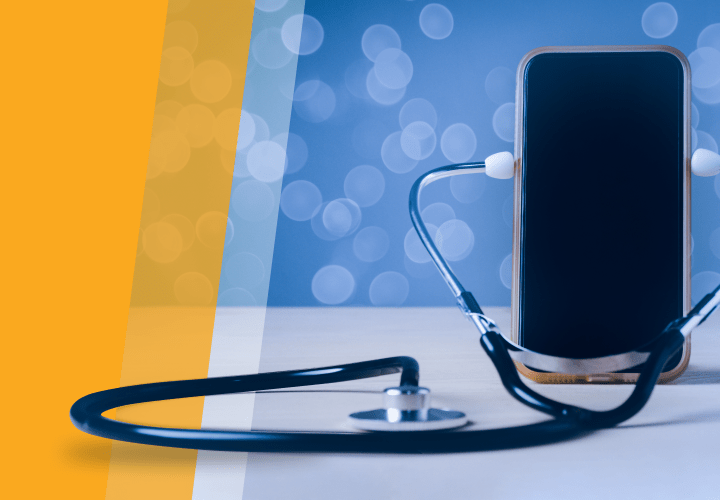Developing mHealth Apps: Types, Must-Have Features, and Real-World Examples
Table of contents
Mobile health apps are transforming the healthcare industry by providing patients with accessible and convenient healthcare services. These apps are designed to improve patient outcomes, increase access to healthcare, and lower costs. As the popularity of mHealth apps continues to grow, it is important to understand their core features and how they can benefit patients and healthcare providers.
Based on our profound expertise in software development for the healthcare industry, Emerline experts are ready to lay out important information related to creating a mobile health solution and share core mHealth app features that are essential for any successful product.
mHealth Apps Today
Based on Statista's data, the existing number of smartphone users worldwide stands at an estimated 6.92 billion. This means about 86.29% of the world’s population owns a smartphone. The proliferation of smartphones has contributed to people having easy access to a range of digital tools and services, including healthcare services.
The mHealth app market has experienced significant growth in recent years. According to a report by ResearchAndMarkets, the global mobile health apps market size is expected to reach 105.9 billion USD by 2030 and is expected to expand at a CAGR of 11.8% over the forecast period.
According to other research, there are over 350,000 mobile health apps available in major app stores, including medical as well as health and fitness apps. This number has approximately doubled since 2015, propelled by increased smartphone adoption and ongoing heavy investment in the digital health industry.
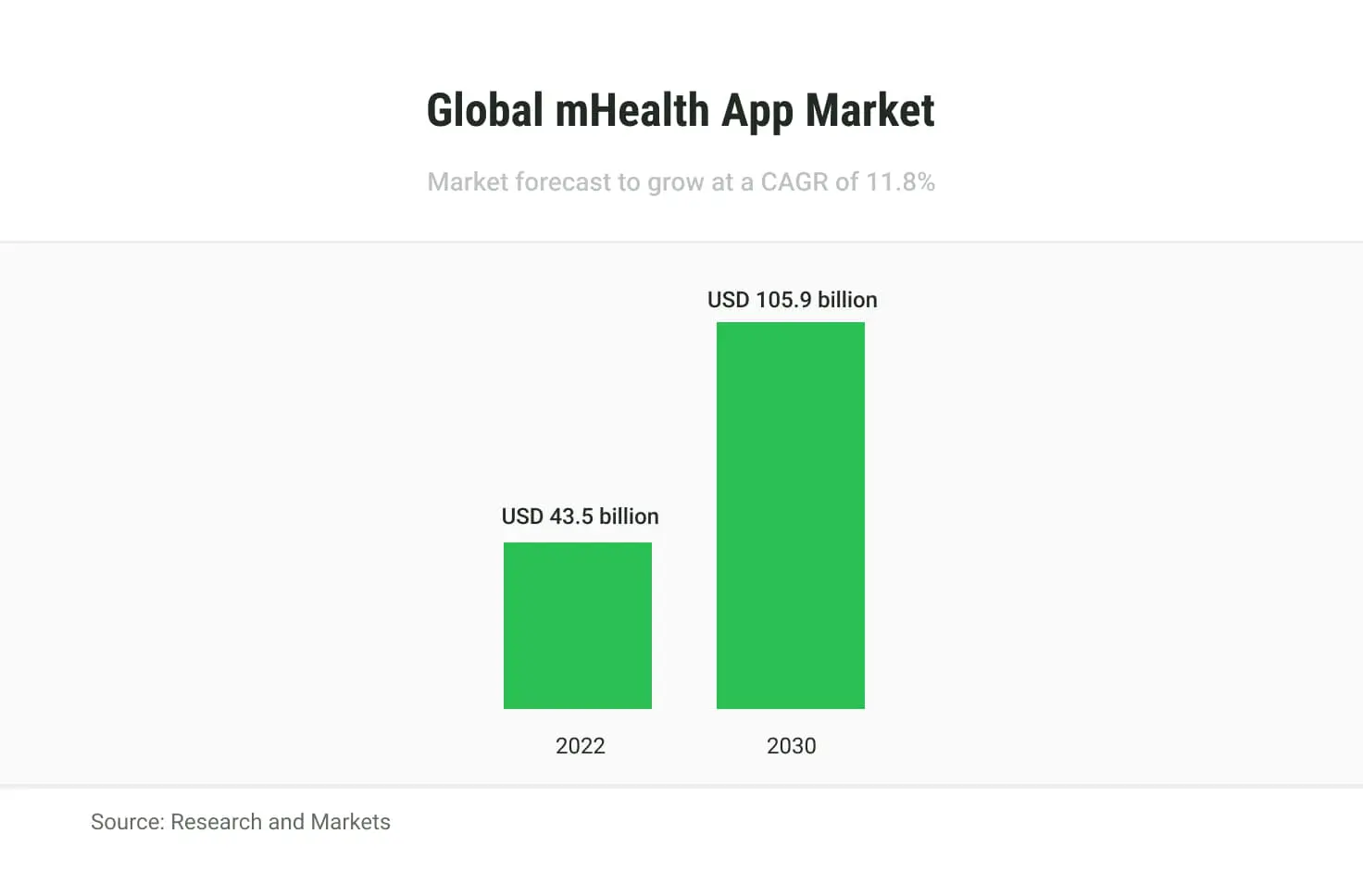
The COVID-19 pandemic has accelerated the adoption of mHealth apps, with more people turning to these apps for remote consultations, self-monitoring, and medication management. Mobile health apps are becoming an essential tool for patients and healthcare providers to manage health and wellness, chronic conditions, and even mental health.
Types of mHealth Apps
Healthcare mobile apps can be divided into two groups 一 professional solutions and applications for patients.
mHealth apps for doctors
mHealth apps for doctors are designed to help healthcare providers improve patient care and streamline their workflow. These apps can range from simple medical reference tools to comprehensive telemedicine platforms that enable doctors to consult with patients remotely. Here are a few of the different types of mHealth apps for doctors:
- Medical reference apps that provide quick access to medical information and guidelines, allowing doctors to make more informed decisions about patient care.
- Electronic health record (EHR) apps that allow doctors to access patient records and manage patient care on the go. They can view patient histories, lab results, and medication lists and can even enter new data into the EHR system.
- Telemedicine apps that enable remote consultations between doctors and patients, allowing healthcare providers to see and treat patients from anywhere.
- Prescription management apps that allow doctors to prescribe medications and manage medication refills, saving time and improving patient adherence.
- Clinical decision support apps that provide evidence-based recommendations for diagnosis and treatment, helping doctors make more informed decisions about patient care.
mHealth apps for patients
Patients need digital health solutions to book appointments, chat with their doctors, or even get recommendations.
When it comes to the patient journey, mHealth applications can be classified into two primary groups: those that foster overall well-being, including fitness and nutrition, and those that focus on disease management by executing treatment regimens, such as reminders to take medications.
According to the report by the IMS Institute of Healthcare Informatics, mobile wellness apps, such as fitness, lifestyle, stress, and diet & nutrition management apps, comprise two-thirds of the mHealth app space. Disease and treatment management comprise approximately a quarter of mHealth apps.
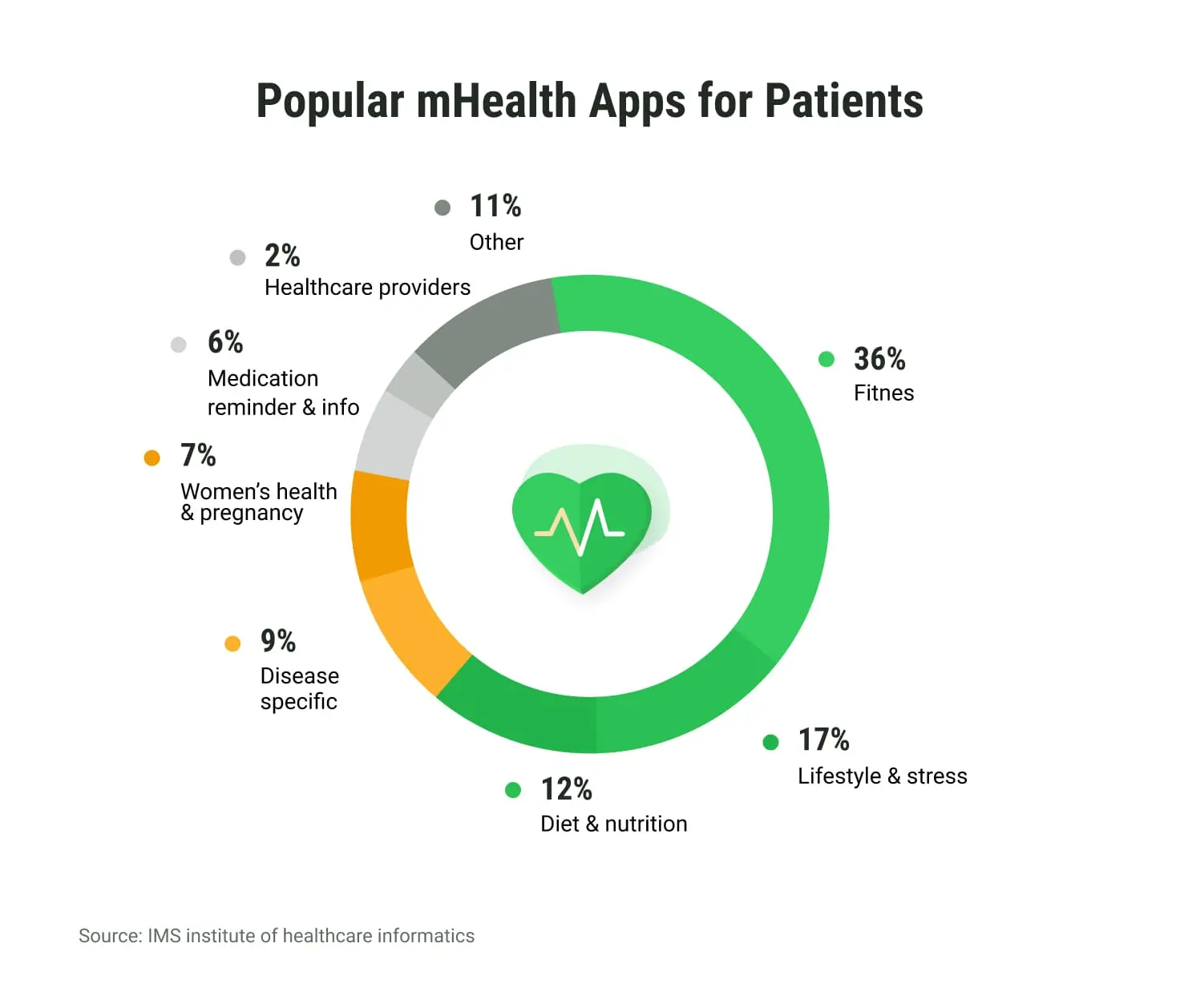
Let’s have a closer look at patient-oriented mHealth applications:
- Fitness apps that help individuals improve their physical fitness and overall health. Fitness apps can track exercise routines, monitor progress, provide nutrition advice, and offer motivational support.
- Lifestyle & stress management apps that help individuals manage their daily lives and reduce stress. These apps can track daily routines, provide tools for managing stress and anxiety, and offer advice on healthy living.
- Diet & nutrition apps are designed to help individuals manage their diets and make healthier food choices. Diet & nutrition apps can track calorie intake, provide nutritional information, offer meal planning suggestions, and allow users to log their food intake.
- Symptom tracking apps. These apps provide guidance on common health concerns and help patients decide when to seek medical attention.
- Mental health apps. These apps offer resources and support for managing stress, anxiety, and other mental health conditions, helping patients improve their mental well-being.
- Chronic disease management apps help patients monitor their symptoms, track their progress, and communicate with their healthcare providers, enabling them to better manage chronic conditions such as diabetes, asthma, and hypertension.
Features of a Successful mHealth App
The feature set of a successful mHealth application depends on the type of application. Let’s figure out the core features of a doctor-oriented application, a patient-oriented application, and a doctor-patient collaboration application.
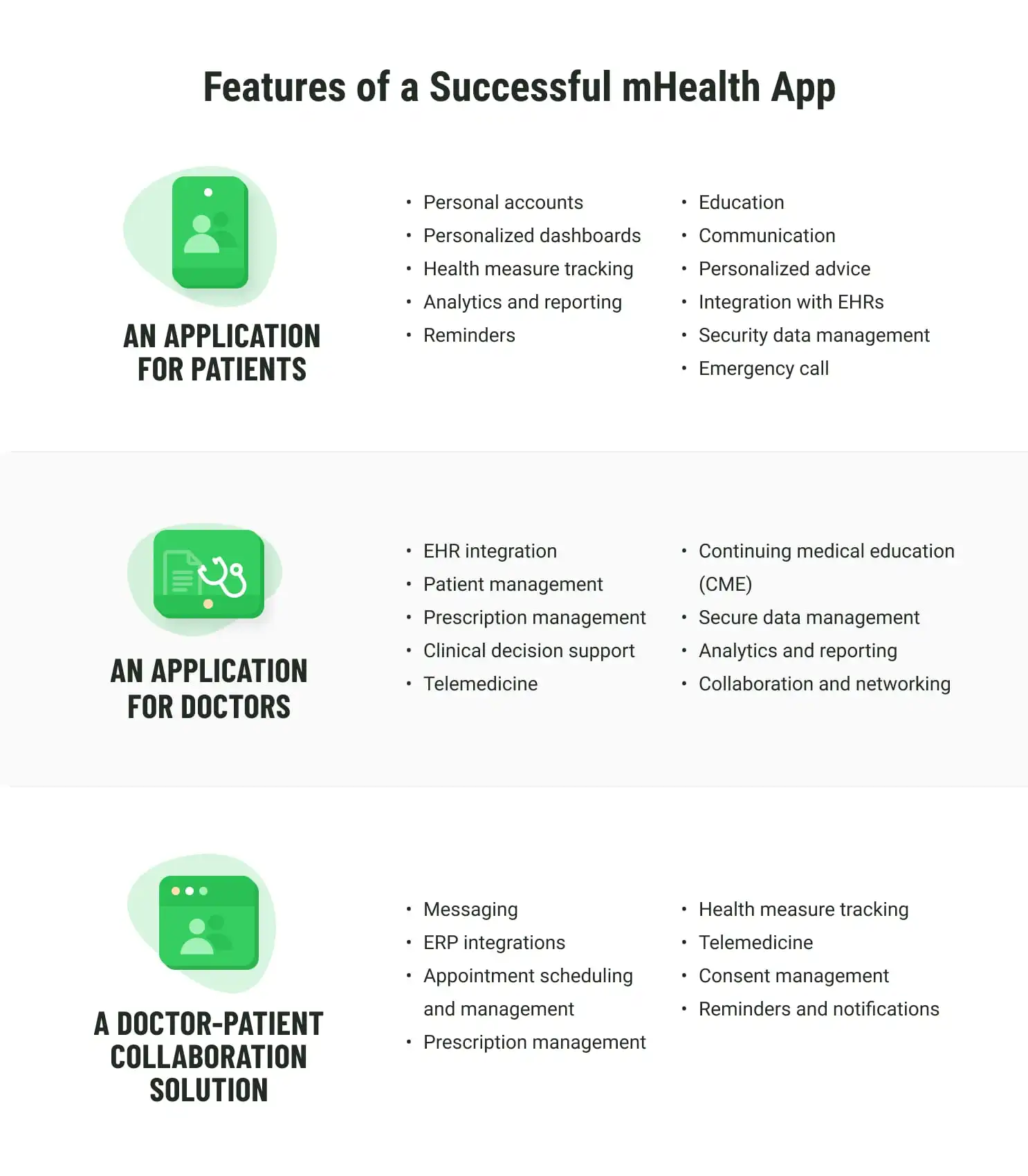
Healthcare mobile applications for patients typically provide a range of features that help patients manage their health and access healthcare resources more easily. These features can include the ability to track and monitor their health data, such as vital signs, symptoms, and medication use, as well as tools for scheduling appointments, accessing educational resources, and communicating with healthcare providers. Many mHealth apps also provide features for setting reminders, tracking exercise and nutrition, and connecting with peer support networks.
mHealth applications for doctors should include features that help doctors manage their patients' health more effectively and improve the efficiency of their practices: the ability to access patient health records, communicate securely with patients and other healthcare providers, schedule appointments, and manage prescriptions and other medical orders. Among other important features is clinical decision support, allowing doctors to access evidence-based treatment guidelines and medical reference materials.
A doctor-patient collaboration application usually includes features and elements of the first two types: secure messaging and telemedicine capabilities that allow doctors and patients to communicate remotely, access to electronic health records, and tools for tracking patient health data and monitoring symptoms. Many mHealth apps also provide features for scheduling appointments, managing medication and treatment plans, and accessing educational resources on health conditions and treatments.
Emerline’s Expertise
Emerline is a leading provider of healthcare app development solutions with a focus on creating innovative and user-friendly apps for the healthcare industry. With years of experience in this field, we have developed a deep understanding of the complex needs and challenges facing healthcare providers, patients, and other stakeholders.
We have created a range of mobile healthcare app solutions, from patient-facing apps that improve engagement and outcomes to provider-focused apps that streamline clinical workflows.
An Uber-like app for doctors with a custom EMR
The Uber-like app for doctors is a doctor-patient collaboration app designed to connect patients with healthcare professionals in a convenient and efficient way, much like the popular ride-sharing app, Uber.
With this app, patients can quickly search for and book appointments with doctors based on their location, availability, and specialty. The app also includes features such as real-time tracking of doctor's locations, in-app messaging, and secure payment processing.
By using the app, doctors can efficiently manage their schedules and appointments, reduce wait times and avoid scheduling challenges, improve patient engagement thanks to the in-app messaging feature, easily find patients, and book appointments.
An advanced mobile menopause management app
An example of a patient-oriented solution is Midday, developed by Emerline’s team. This is an iOS application for menopause management that empowers women approaching or going through perimenopause or menopause.
The solution allows women to record changes associated with menopause, including mood changes, anxiety, hot flashes, and weight gain. The app's symptom-tracking system analyzes the data collected and provides women with valuable insights into what is happening physically and emotionally. Equipped with AI-driven technology, the application provides virtual care and personalized tips for managing and calming the symptoms.
A migraine alert application
Emerline has created a cutting-edge web and mobile application designed to prevent migraines and enhance overall wellness. By harnessing the power of advanced data analysis, the app helps users reduce the likelihood of migraine attacks and enjoy a more fulfilling life. The app leverages three key types of data to accomplish this goal: environmental factors, such as changes in barometric pressure and exposure to bright sunlight; behavioral data, like diet, sleep patterns, and physical activity; and personal information, including age and gender.
Our team has revolutionized the design of our client's app by creating a sleek and user-friendly interface for both iOS and Android versions. Thanks to our work, our client can:
- Resell the product to any third-party service provider, allowing them to implement their branding elements and a color theme that reflects their unique identity.
- Provide users with a visually appealing solution and intuitive experience.
- Reach a wider audience by offering versions for an additional platform.
- Be sure that the app is free of errors and provides the seamless user experience that our client desires.
Conclusion
Building a successful mHealth app requires a customized approach that reflects the unique needs and goals of each project. That's where we come in. Our team of experts offers flexible collaboration options, including dedicated teams and staff augmentation, to deliver tailored solutions that meet our clients' specific requirements.
With extensive experience in the healthcare industry, we are well-equipped to guide our clients through the development process and help them create an app that delivers real value to users. To learn more about our services and how we can support your mHealth app development project, book a free consultation with our experts right now.
Published on Apr 14, 2023
